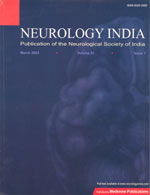
|
Neurology India
Medknow Publications on behalf of the Neurological Society of India
ISSN: 0028-3886
EISSN: 0028-3886
Vol. 57, No. 3, 2009, pp. 288-294
|
 Bioline Code: ni09085
Bioline Code: ni09085
Full paper language: English
Document type: Research Article
Document available free of charge
|
|
|
Neurology India, Vol. 57, No. 3, 2009, pp. 288-294
| en |
An appraisal of blood-cerebrospinal fluid barrier dysfunction during the course of Guillain Barrι syndrome
González-Quevedo, A.; Carriera, Fernández R.; O´Farrill, Z. Lestayo; Luis, I. Suárez; Bécquer, R. Mustelier & González, R. S. Luis
Abstract
Background: Elevated cerebrospinal fluid (CSF) total protein (TP) concentration (mainly due to a dysfunctional blood-CSF barrier (B-CSFB)) with normal cell count is a hallmark for the diagnosis of Guillain-Barrι syndrome (GBS). Aims: This work presents the evaluation of B-CSFB dysfunction with respect to the course, severity, and clinical features of GBS. Materials and Methods: A sample of CSF was collected on admission from 68 patients of both genders (15 children and 53 adults) diagnosed with GBS. A follow-up CSF sample was obtained approximately 15 days after admission. TP concentration was determined in the CSF and 7.5% polycrylamide gel electrophoresis was employed for serum and CSF protein fractioning. A low percentage of prealbumin fraction was considered a test of impaired B-CSFB. Results: Elevated TP concentration and lower prealbumin were observed in almost 70% of the patients on admission, but this percentage was lower (52.4%) during the first week from onset of symptoms. Both variables were directly associated with the time of evolution of the disease and also with a greater clinical severity. Follow-up CSF studies showed higher CSF TP and lower prealbumin percentages, while deceased patients did not display this response pattern in the follow-up CSF. Conclusions: B-CSFB dysfunction was present in only half of the patients with GBS during the first week from onset and it was directly associated with progression and clinical severity; nevertheless, a low B-CSFB dysfunction response during follow-up was associated with a lethal outcome, suggesting it could also serve a ′protective′ effect during regeneration.
Keywords
Blood-brain barrier, cerebrospinal fluid, Guillain-Barrι syndrome
|
| |
© Copyright 2009 Neurology India.
Alternative site location: http://www.neurologyindia.com
|
|
